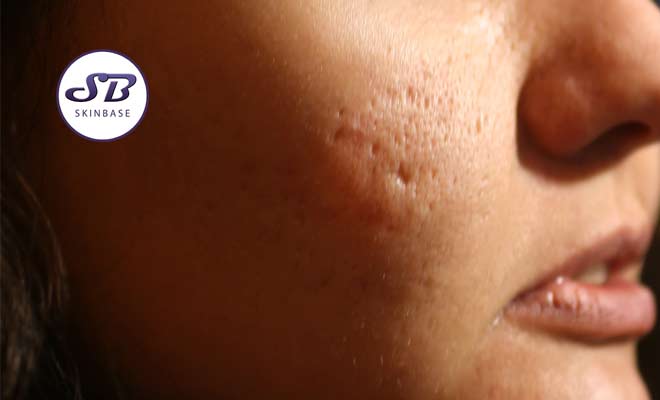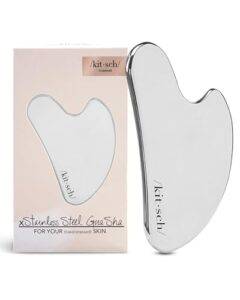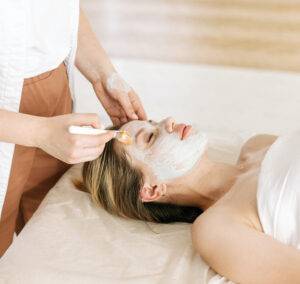This Site Is A Participant In The Amazon Services LLC Associates Program. We may earn money or products from Amazon or the companies mentioned in this post.
Yes, microdermabrasion is a good treatment option for acne. Microdermabrasion helps in removing the dead skin cells and unclogging the pores, enabling the skin to breathe, and reducing the appearance of acne.
It is a minimally invasive procedure that improves skin texture, tone, and overall appearance. Microdermabrasion for acne has proven to be beneficial for many individuals seeking to treat their acne, and it is a popular choice among dermatologists and aestheticians.
In this article, we will discuss what microdermabrasion is, how it works for acne, and the expected results. We will also answer common questions about the treatment and discuss its potential risks.

Credit: skinbase.co.uk
What Is Microdermabrasion?
Microdermabrasion is a popular skin rejuvenation treatment that has been around since the 1980s. Some people use it to help reduce the appearance of acne, while others use it to improve the texture and tone of their skin. But what is microdermabrasion, exactly, and how does it differ from other acne treatments?
In this section, we’ll take a closer look.
Definition And Explanation Of Microdermabrasion
Microdermabrasion is a non-invasive skin exfoliation procedure that uses tiny abrasive crystals or a diamond-tipped wand to remove the uppermost layer of dead skin cells. This resurfacing technique can help improve the appearance of fine lines, wrinkles, age spots, acne scars, and hyperpigmentation.
It’s typically performed by a licensed aesthetician or dermatologist in a spa or clinic setting.
Here are some key points to remember about microdermabrasion:
- It’s safe and gentle for most skin types.
- It’s often used as a standalone treatment or in combination with other skincare therapies.
- It can help improve the absorption and efficacy of topical skincare products.
- It usually takes less than an hour to complete a session.
- It’s relatively painless and requires no downtime.
How Microdermabrasion Differs From Other Acne Treatments
While microdermabrasion can be effective in reducing the appearance of acne, it works differently than other more traditional acne treatments. Here are some ways in which it differs:
- Microdermabrasion helps improve overall skin texture and tone and can help unclog pores, which makes it a good option for those with mild acne or acne-prone skin.
- Unlike some harsher acne treatments, microdermabrasion doesn’t use chemicals or medications, which means there’s little to no risk of adverse side effects.
- However, microdermabrasion may not be the best treatment option for those with more severe or cystic acne, as it may not be powerful enough to effectively treat deep-rooted acne lesions.
- In some cases, microdermabrasion may need to be combined with other acne treatments, such as topical or oral medications, to achieve optimal results.
Ultimately, whether or not microdermabrasion is a good option for acne-prone skin depends on the individual’s unique needs and skin type. It’s always best to consult with a skincare professional to determine the best course of treatment for your specific concerns.
How Microdermabrasion Works For Acne
Is A Microdermabrasion Good For Acne?
If you have been looking for an effective way to reduce acne, you may have heard of microdermabrasion. So, let’s dive in and find out whether this treatment is good for your acne-prone skin.
The Science Behind Microdermabrasion Treatment And Like Acne
Microdermabrasion is a non-invasive procedure that uses a special device to exfoliate the topmost layer of your skin. The device sprays tiny crystals or uses a diamond-tipped wand to remove dead skin cells, acne scars, and other impurities on the surface.
It’s a popular cosmetic procedure that can help you achieve a more refreshed, smoother and radiant complexion. But how does it work for acne?
How Microdermabrasion Helps In Reducing Inflammation And Excess Oil Production
Acne is caused by inflammation and excess oil production, which result in clogged pores and pimples. Microdermabrasion can help in the following ways:
- Exfoliation: By gently removing the dead skin cells and impurities, the microdermabrasion procedure can unclog the pores and allow the skin to breathe.
- Stimulation: The procedure stimulates blood circulation and promotes the production of collagen and elastin. This can help to reduce the appearance of acne scars and promote healing.
- Oil control: Microdermabrasion can help to reduce excess oil production by removing the top layer of the skin, where most of the oil accumulates. This can help to prevent future breakouts.
In addition to the above benefits, microdermabrasion can also improve the absorption and effectiveness of topical acne treatments.
Overall, microdermabrasion can be a good option for treating acne, but it’s important to note that it’s not a stand-alone treatment. It should be used in conjunction with other acne treatments and a proper skincare routine.
If you are looking for an effective way to reduce acne, microdermabrasion could be a great addition to your skincare regimen. Consult with a skincare professional to determine whether microdermabrasion is right for you.
Advantages Of Microdermabrasion For Acne
Microdermabrasion is a cosmetic treatment that boasts many benefits. It involves the use of a special device to mildly exfoliate the top layer of the skin. This process removes dead skin, unclogs pores, and improves skin texture. Microdermabrasion can also be an effective treatment for acne-prone skin.
We will discuss the advantages of microdermabrasion for acne and how it works.
Detailed Benefits Of Microdermabrasion For Acne-Prone Skin
Microdermabrasion is a non-invasive treatment that can help reduce acne breakouts. Here are some of the advantages of microdermabrasion for acne-prone skin:
- Removes dirt and oils: Microdermabrasion helps to unclog pores, which can reduce the amount of dirt and oils on the skin. This, in turn, can prevent the formation of pimples and blackheads.
- Reduces inflammation: Microdermabrasion can also help reduce inflammation caused by acne. When the top layer of dead skin is removed, the skin is stimulated to produce new skin cells and collagen, which can lead to a smoother, clearer complexion.
- Prevents future breakouts: By removing dead skin cells, microdermabrasion can stimulate the growth of new skin cells, reducing the likelihood of future breakouts. This treatment can also help to reduce the appearance of acne scars, making microdermabrasion a great option for those with acne-prone skin.
How Microdermabrasion Can Help In Reducing Acne Scars
Acne scars can make people feel self-conscious, and in some cases, they can be challenging to get rid of. Microdermabrasion can be an effective treatment for reducing the appearance of acne scars. Here are some ways that this non-invasive treatment can help:
- Smoother skin texture: Microdermabrasion can help to smooth out the texture of the skin, which can reduce the appearance of acne scars. By removing the top layer of dead skin cells, new skin cells are stimulated to produce, making the skin appear smoother and more even.
- Improved skin tone: Microdermabrasion can also improve the overall tone of the skin. By removing dead skin cells, the skin is stimulated to produce new, healthy skin cells, which can reduce the appearance of acne scars.
- Collagen production: Microdermabrasion can also stimulate collagen production, which can help to fill in acne scars. This non-invasive treatment can also help to reduce the appearance of fine lines and wrinkles, making it a great option for those looking for an overall improvement in their complexion.
How Frequently You Can Take Microdermabrasion For Acne-Prone Skin
If you are interested in using microdermabrasion to treat your acne-prone skin, you may be wondering how often you can take this treatment. Generally, it is recommended to wait at least two weeks between treatments. This allows the skin to heal and produce new skin cells.
However, this can vary based on your individual circumstances, such as the severity of your acne or your skin type. Consulting with a dermatologist can help you determine the best frequency of treatment for your specific needs.
Microdermabrasion is an effective and non-invasive treatment for those with acne-prone skin. By removing dead skin cells, unclogging pores, and stimulating collagen production, microdermabrasion can improve skin texture and reduce the appearance of acne scars. Although the recommended frequency of treatment may vary, microdermabrasion is a great option for anyone looking to achieve a clearer, more glowing complexion.
Risks And Side Effects Of Microdermabrasion For Acne
Is A Microdermabrasion Good For Acne?
Acne can make you feel embarrassed and self-conscious, leading many to seek treatments like microdermabrasion. However, before diving into this popular treatment, it’s essential to know the potential risks and side effects of microdermabrasion for acne.
Possible Risks Involved In Microdermabrasion Treatment
Microdermabrasion is a minimally invasive cosmetic procedure, but like all treatments, it can pose certain risks. Here are some possible risks during microdermabrasion treatment:
- Skin irritation or redness
- Swelling
- Bruising
- Broken capillaries
- Infection
- Scarring
Understanding The Side Effects Of Microdermabrasion On Acne-Prone Skin
While microdermabrasion can help reduce acne in some people, it can also have side effects. Here are some side effects that can occur on acne-prone skin:
- Dryness
- Flakiness
- Sensitivity
- Redness
- Inflammation
Precautions To Take While Undergoing Microdermabrasion For Acne
Before undergoing microdermabrasion for acne, there are precautions you can take to minimize the risks and side effects. Here are some precautions to keep in mind:
- Consult with a skincare professional who is experienced with microdermabrasion and acne-prone skin
- Avoid direct sun exposure for at least a week before and after treatment
- Stay hydrated before and after the procedure
- Avoid using exfoliating products for at least a week before and after treatment
- Use a gentle, non-comedogenic moisturizer after the procedure
- Don’t apply makeup or any other products to the treated area for at least 24 hours after the procedure
Microdermabrasion can be a useful tool in treating acne, but it’s important to understand the potential risks and side effects. By taking proper precautions and working with a qualified skincare professional, you can minimize these risks and enjoy the benefits of microdermabrasion for acne-prone skin.
Alternatives To Microdermabrasion For Acne
Microdermabrasion is a popular skincare treatment that helps to exfoliate and rejuvenate the skin. Many people wonder if microdermabrasion is good for acne and if there are other alternatives available. In this blog post, we’ll take a closer look at microdermabrasion, how it compares to other acne treatments, and other remedies available to alleviate acne.
A Brief Overview Of Other Treatments And Remedies Available For Acne
There are several treatments and remedies available for treating acne. Some of these include:
- Topical acne treatments: There are many over-the-counter topical creams, lotions, and gels available that contain ingredients like benzoyl peroxide, salicylic acid, or retinoids that help treat acne.
- Oral medications: Your dermatologist may prescribe antibiotics, anti-androgens, or birth control pills for acne that do not respond to topical treatments.
- Chemical peels: Performed by a dermatologist, these peels remove the top layer of the skin to reveal smoother, clearer skin beneath.
- Laser therapies: Lasers target the bacteria that cause acne and reduce redness and inflammation.
How Microdermabrasion Compares With Other Treatments For Acne
While microdermabrasion can help exfoliate the skin and reduce the appearance of acne scars, it may not be the best treatment option for acne. Microdermabrasion is not effective in treating active acne. In fact, it can aggravate active acne, causing more inflammation and breakouts.
This is why other acne treatments may be a more effective choice.
Topical acne treatments are generally the first line of defense for mild to moderate acne. These treatments contain ingredients like benzoyl peroxide, salicylic acid, or retinoids. They work by helping to unclog pores and decrease inflammation. Oral medications like antibiotics, anti-androgens, or birth control pills can also be effective in treating severe or persistent acne.
Chemical peels and laser therapies can be effective in reducing the appearance of acne scars.
Is Microdermabrasion The Best Treatment For Acne?
Microdermabrasion is not the best treatment choice for acne. While it can help reduce the appearance of acne scars, it may worsen acne breakouts. If you have active acne, it’s best to use other treatments that target the root cause of acne – clogged pores and inflammation.
Using topical acne creams, oral medications, chemical peels, or laser therapies may be more effective in treating acne.
While microdermabrasion can help improve the overall texture and appearance of the skin, it is not the best treatment choice for active acne. Using other treatments that are targeted to address the root cause of acne is the better option.
Consult with your dermatologist to determine the best treatment plan for your acne.
Frequently Asked Questions Of Is A Microdermabrasion Good For Acne?
Is Microdermabrasion A Good Treatment For Acne-Prone Skin?
Yes, microdermabrasion can effectively treat acne-prone skin by exfoliating dead skin cells, reducing the appearance of acne scars, and improving skin texture. It is a non-invasive treatment that removes oil, dirt, and bacteria from pores, preventing future breakouts.
How Does Microdermabrasion Work For Acne?
Microdermabrasion works by removing the outer layer of dead skin cells using a diamond-tipped wand or a stream of tiny crystals. This process unclogs pores and stimulates collagen production, which helps reduce acne scars and fine lines. It also exfoliates the skin, leaving it smoother and clearer.
How Many Microdermabrasion Treatments Are Needed For Acne?
The number of treatments needed for acne depends on the severity of the condition and the specific needs of the individual. Typically, a series of six to eight treatments, spaced two weeks apart, is recommended for optimal results. However, some people may require more or less treatments.
Can Microdermabrasion Make Acne Worse?
In rare cases, microdermabrasion can make acne worse if the skin is overly sensitive, or the treatment is too aggressive. It is essential to have the treatment done by an experienced licensed aesthetician to avoid complications. Mild redness and irritation are normal after the procedure, but severe acne breakouts are not common.
Is Microdermabrasion Safe For Sensitive Skin Prone To Acne?
Microdermabrasion is safe for sensitive skin prone to acne, provided that a mild diamond tip or crystal stream is used. Finer tips and lower suction settings will not irritate the skin or cause inflammation. Still, it is essential to consult a licensed aesthetician before undergoing treatment to determine the best course of action.
How Long Will The Results Of Microdermabrasion Last For Acne?
The results of microdermabrasion for acne can last up to several months, depending on the individual’s skin type, lifestyle habits, and skincare regimen. Regular maintenance sessions may be necessary to maintain improvements. However, if an individual has active acne, they should continue their regular acne treatment with a dermatologist to help prevent further breakouts.
Conclusion
Effective acne treatment is of utmost importance for so many people worldwide. Microdermabrasion is one of the popular options for treating acne. After analyzing multiple scientific studies and feedback from dermatologists, it can be safely concluded that microdermabrasion can be a good option for acne treatment.
It’s non-invasive nature and minimal side-effects make it an easy option for those with mild to moderate acne. This procedure reduces the appearance of acne scars and helps to unclog pores. However, it’s crucial to remember that this procedure has its limitations and may not work for everyone.
It’s always best to consult a dermatologist to determine the most effective acne treatment according to individual needs. Microdermabrasion can be an excellent add-on to an acne treatment regimen, leading to clearer and smoother skin with minimal discomfort and downtime.

Amelia Varley is a professional beauty blogger and freelance writer with a passion for all things skincare, makeup, and holistic wellness. With years of experience in the beauty industry, Amelia shares expert tips, product reviews, and innovative beauty routines with her readers. Her writing is driven by a desire to empower people to look and feel their best through mindful beauty practices. When she’s not writing, Amelia enjoys experimenting with the latest beauty trends and exploring the connection between self-care and confidence.





